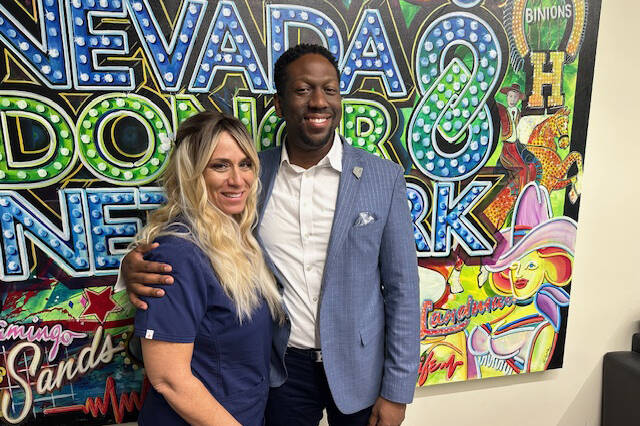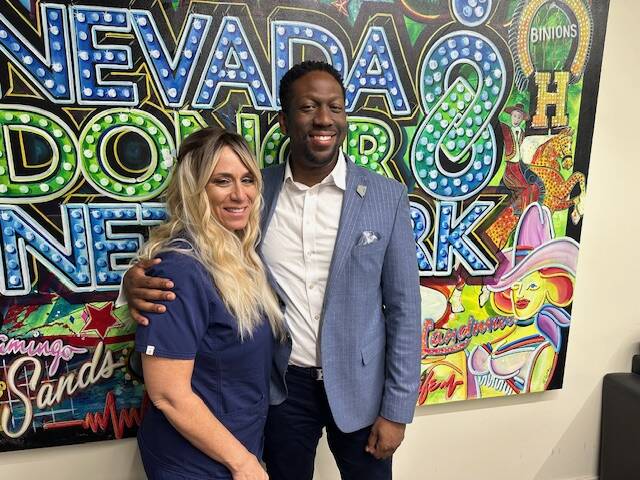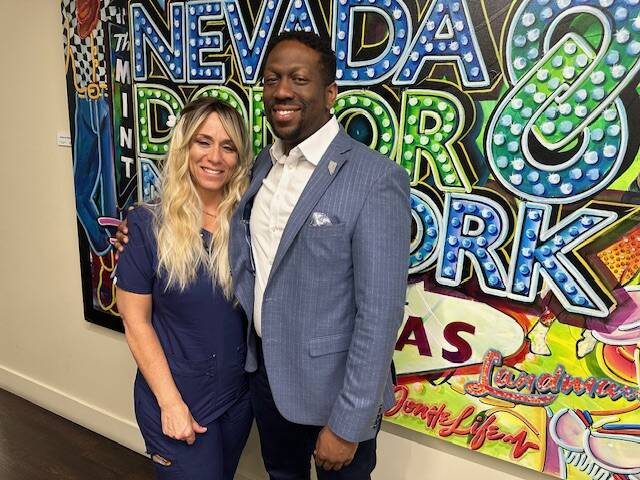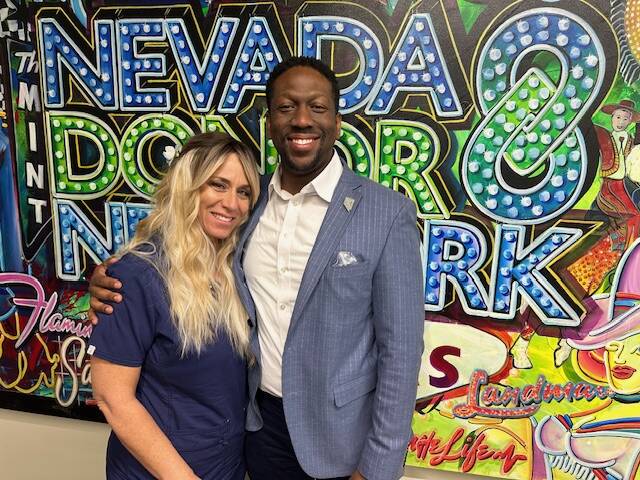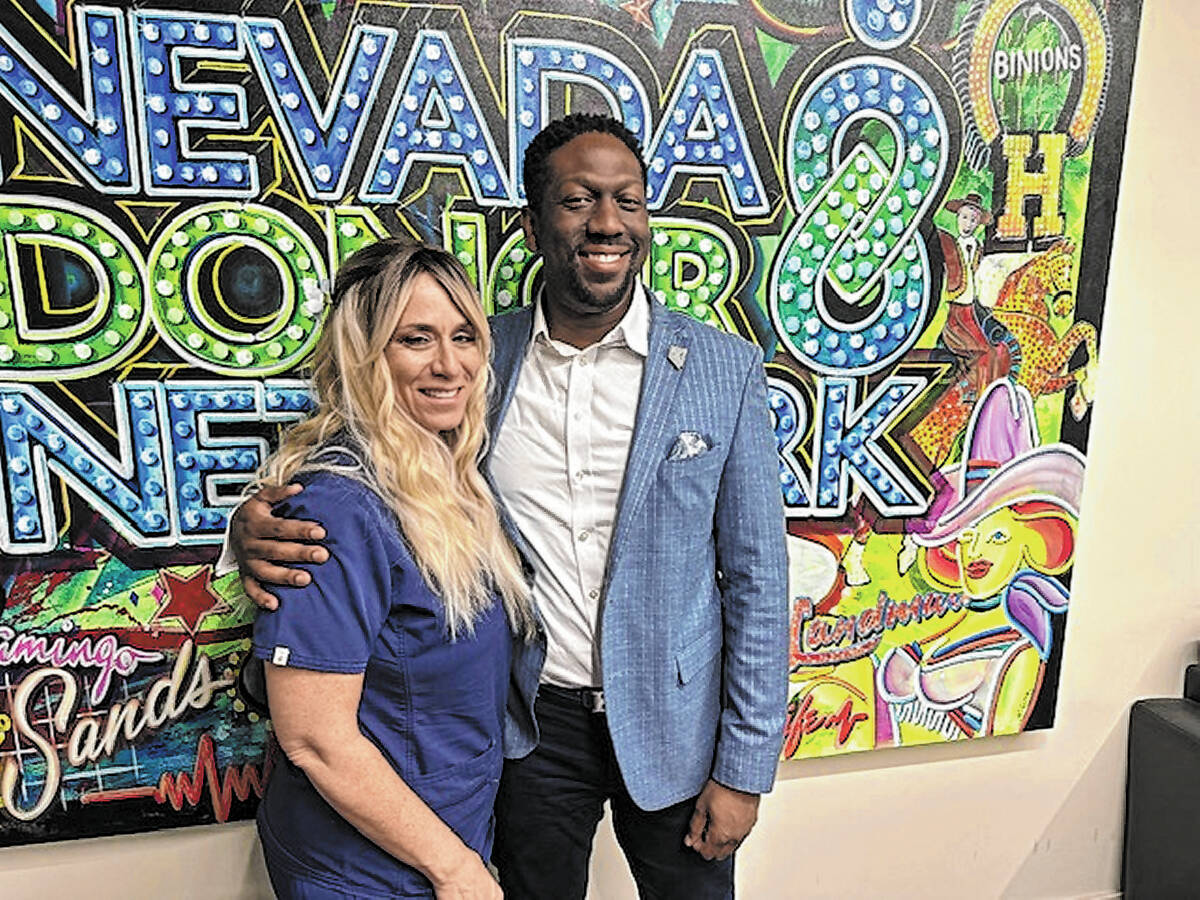‘It’s a heroic thing to do’: Two people reflect on organ donation process in their lives
The process of organ donation and transplanting those organs in place of diseased or dysfunctional ones is frustrating, lengthy, complicated and expensive.
Just ask Courtney Kaplan, who oversaw her late son’s donation of six of his organs in 2017, and Tyre Gray, who received a life-saving kidney in 2012 when both of his kidneys were so close to failing he had perhaps only months to live.
But their ordeals inspired them to join forces at Nevada Donor Network, a Las Vegas nonprofit that assists families of organ and tissue donors and the recipients who desperately need a transplant, mostly to stay alive.
Kaplan, 48, is a volunteer and guest speaker, while Gray, 43, a lawyer, decided to leave a lucrative career to become the nonprofit’s chief administrative officer.
Kaplan recalled when she and her teenage son, Michael “Mikey” Sigler, went to the Nevada Department of Motor Vehicles in Las Vegas for his motorcycle license, and he opted to be an organ donor, checking all of the boxes, including for his major organs, tissue and eyes.
“And, of course, you hope that you’re never going to need that, right?” Kaplan said. “It’s a heroic thing to do.”
But that day came, on May 17, 2019, when she arrived at the quiet room at University Medical Center, waiting to hear about the condition of her son who was in surgery for critical injuries after a car struck his motorcycle, sending him and his helmet flying.
Michael Sigler died later that day at age 18, just days short of his graduation day at Cimarron Memorial High School. Kaplan gave a nurse his driver’s license showing he was an organ donor. The hospital contacted the donor network.
‘I know what you are going through’
Kaplan said her tribulations helped assuage the grief she felt from her son’s sudden death, and served as the basis for her newly published book, “Transplant Hope.”
“I had just stepped into this tragedy,” she said. “Like immediately, I needed people to know that I was there. I had lived through this. I know what you are going through.”
The process of harvesting her son’s organs took about four days as nurses and clinicians “were in the room every 20 minutes” doing extensive tests on her son’s body “to make sure the organs were viable … matching the blood and then the antibodies,” she said.
“There is so much involved, because, yes, this is a second chance at life, but you don’t want to get his part wrong either,” Kaplan said. “So on the fourth day we learned that Michael would be saving, at that time they told us, seven lives.”
Both of Michael’s lungs were removed as were both kidneys, his heart, pancreas and liver, she said.
One kidney went to a 25-year-old woman, the other to a 40 year-old man, the liver to a 57-year-old man, heart to an 18-year-old man and both lungs to a 61-year-old man, she said.
Kaplan met the man, named Harold, who received the lungs to save his ability to breathe after suffering from pulmonary fibrosis — hardening of the lungs — that would be terminal without a transplant. He had only about a month left in his life, she said.
“He had actually been called five other times for a transplant, and all of them fell through until Mikey,” she said. “He was a perfect match. Perfect size antibodies, everything matched.”
The bittersweet moment made her feel proud.
“You know how proud? I mean, that’s life, finding a way, and to be part of it as much as I miss him every single day,” she said, “I would not trade this experience. I wouldn’t, I wouldn’t, I wouldn’t.”
From her work with the donor network, Kaplan learned that more than 100,000 people in the country are on the waiting list for a transplant, about every 17 minutes someone else is added to the list, and that every eight minutes someone waiting for a transplant dies.
In Nevada, she said, “we have got 650 plus individuals on the transplant list,” she said.
Different dilemma
The state also has another dilemma — Nevada has no official transplantation center. That means those with major organ transplant surgery must have it done elsewhere, such as California, Utah or Arizona. The exception is kidneys which can be transplanted at UMC, she said.
“So if you have a 3-year-old who needed a heart, you have to leave the state,” she said.
The donor center has been trying to raise not only awareness about that need, but also funds for the approximately $35 million necessary for a local clinic or hospital to perform at least 10 transplants for free, she said.
Only then can the state be certified by the U.S. government and receive benefits for surgery costs from Medicare, since the bill for a transplant can amount to about $1 million if not covered by health insurance.
“So that’s the mission forward” for the donor network, she said.
Considering mortality
Gray recalls that when he was 23, he felt “invincible,” he said. “You think you can run through a wall.”
He went to a doctor for a physical checkup and later received a call back, when he assumed “it’s like a billing issue or something, right?”
They asked him to talk to a specialist because of the overabundance of protein in his urine, which he didn’t consider serious.
“But little did I know that protein in your urine is an indicator for your kidneys not performing at their max capacity,” Gray said. “And so I found out relatively quickly that my kidneys were (functioning) at about 60 percent.”
“And it was just jaw-dropping to have someone say, ‘Hey, you may at some point probably are going to need a kidney transplant,” he said.
According to the National Kidney Foundation, “a major function of the kidneys is to remove waste products and excess fluid from the body. These waste products and excess fluid are removed through the urine.”
Gray described his thinking as “the cycle of grief,” first with denial and then a couple years later reaching acceptance when he got a call that he had to go in to be hooked to a dialysis machine to help his declining kidneys function, and also would require a transplant.
He had to consider his own mortality at a young age.
“When you’re in your twenties, you just, it’s not something you think about,” he said. “Because it becomes real when they’re like, OK, you’re on the [donor needed] list. We need to find someone. It makes you pause — so how close am I, like how long do I have? And I think that experience has colored my entire life.”
Gray decided to continue with his life, working hard and entering UNLV’s William S. Boyd law school. As he was going to classes, his kidney function declined drastically, from only 13 percent to a life-threatening 6 percent, as he waited for a transplant.
His life was in danger, his days were numbered. He felt fatigued with the impurities in his system. “It could have been anywhere from three, six, nine months, you just don’t know, right?” he said.
One day in September 2012, as he walked to a law class, he received a call that a kidney was available that day. He told the dean of the school. Gray had resisted telling others to avoid feeling vulnerable.
In an urge for a little celebration, he went to a nearby pizza place, ate a pizza and drank a beer. Then he went to UMC that afternoon and by about 10 p.m., he was prepped and ready for the transplant.
The surgery at UMC did not include the removal of his two low-functioning kidneys. They remained there since there was no evidence of disease that might spread elsewhere in his body. What the doctors did was add a donor’s healthy kidney, meaning he had three kidneys inside, the good one all he needed to filter out his body’s impurities.
‘It was a gift’
He remained at UMC for four days and stayed in town with his mother, who had flown in from San Diego.
“I could feel more energy almost instantly,” Gray said. “Just my body felt like itself again, and I hadn’t felt that in a long time. It was a gift.”
He had to wait through a 90-day recovery period to see if an infection occurred or if his body rejected the foreign organ, and it did not, thanks to the 20 anti-rejection medications he has to take every day, even now.
The chance of rejection never goes away, he said.
In the years since his life was saved, he became a father, a lawyer, passed the bar exams for Nevada, California and Arizona, argued cases in state and federal courts and was appointed the first African American male president of the Nevada Mining Association trade group.
After the 10th anniversary of his transplant, he thought about going in a different direction.
“I want to give back,” he said he told an executive at the donor network. “I want to do more. And he called me and said, ‘Hey, we’re doing some cool stuff, would you ever consider working for us?’ And I was like, ‘Sure.’ It’s a unique opportunity to be able to give back and change the lives of other people.”
“One gift of life that somebody elects can save up to eight people,” he said. “What cool and amazing little children are here because they got that gift? And so for me, it’s, it’s a blessing. And I mean, I’m thankful.”
For more information on the Nevada Donor Network, visit www.nvdonor.org.
Contact Jeff Burbank at jburbank@reviewjournal.com or 702-383-0382. Follow him @JeffBurbank2 on X.



